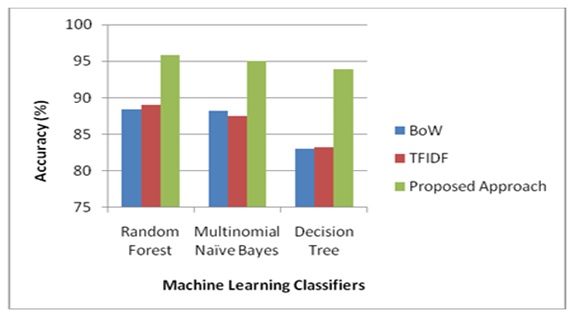Sentiment Classification on Mobile Review Using Extraction of Sentiment Conveying Sentences

DOI:
https://doi.org/10.54060/a2zjournals.jieee.116Keywords:
Sentiment Analysis, Machine Learning, Sentiment Conveying Sentence Extraction, Sentiment ClassificationAbstract
In the present time, sentiment analysis has become the most successful technique to identifying people's views, opinions or emotions about any product, service or event. Sentiment analysis became more popular as a result of the widespread use of e-commerce sites and social media platforms such as Twitter, Facebook etc. by individuals who want to express their feelings, views emotions or opinions about any product, service or event. Individuals make efforts in order to express themselves. Sentiment analysis is extremely helpful for companies that are selling a product to determine how their product was perceived by consumers. Therefore, it has become essential to generate fast, reliable and efficient techniques for mining user reviews. In this paper, we have proposed an approach to extract sentiment conveying sentences from the review and used three machine learning classifiers: Random Forest, Mul-tinomial Naïve Bayes and Random Forest. The experimental results show that the machine learning classifiers achieve higher accuracy and Random Forest achieve highest accuracy.
Downloads
References
A. H. Alamoodi et al., “Sentiment analysis and its applications in fighting COVID-19 and infectious diseases: A systematic review,” Expert Syst. Appl., vol. 167, no. 114155, p. 114155, 2021. https://doi.org/10.1016/j.eswa.2020.114155
S. Zahoor and R. Rohilla, “Twitter sentiment analysis using lexical or rule based approach: A case study,” in 2020 8th In-ternational Conference on Reliability, Infocom Technologies and Optimization (Trends and Future Directions) (ICRITO), 2020. https://doi.org/10.1109/ICRITO48877.2020.9197910
O. Oyebode and R. Orji, “Social media and sentiment analysis: The Nigeria presidential election 2019,” in 2019 IEEE 10th Annual Information Technology, Electronics and Mobile Communication Conference (IEMCON), 2019. https://doi.org/10.1109/IEMCON.2019.8936139
Q. Le, & T. Mikolov, “Distributed representations of sentences and documents”, In Proceedings of the 31st International Conference on Machine Learning (ICML-14), pp. 1188-1196, 2014.
O. Y. Adwan, M. Al-Tawil, A. Huneiti, R. Shahin, A. Abu Zayed, and R. Al-Dibsi, “Twitter Sentiment Analysis Approaches: A Survey,” Int. J. Emerg. Technol. Learn., vol. 15, no. 15, p. 79, 2020. https://doi.org/10.3991/ijet.v15i15.14467
M. Giatsoglou, M. G. Vozalis, K. Diamantaras, A. Vakali, G. Sarigiannidis, and K. C. Chatzisavvas, “Sentiment analysis lever-aging emotions and word embeddings,” Expert Syst. Appl., vol. 69, pp. 214–224, 2017.
P. Yin, H. Wang, and L. Zheng, “Sentiment classification of Chinese online reviews: analysing and improving supervised machine learning,” Int. J. Web Eng. Technol., vol. 7, no. 4, p. 381, 2012.
R. Xia, T. Wang, X. Hu, S. Li, and C. Zong, “Dual Training and Dual Prediction for Polarity Classification,” in ACL, 2013, pp. 521–525.
M. Guia, “Comparison of Naïve Bayes, Support Vector Machine, Decision Trees and Random Forest on Sentiment Analy-sis”,” KDIR, 2019 - scitepress.org
K. Zahoor, N. Z. Bawany, and S. Hamid, “Sentiment analysis and classification of restaurant reviews using machine learn-ing,” in 2020 21st International Arab Conference on Information Technology (ACIT), pp. 1–6, 2020.
D. M. E.-D. Mohamed and M. H. N. El-din, “Performance Analysis for Sentiment Techniques Evaluation Perspectives,” in Proceedings of the International Conference on Advanced Intelligent Systems and Informatics 2017, Cham: Springer In-ternational Publishing, 2018, pp. 448–457
Q. Gu, L. Zhu, and Z. Cai, “Evaluation measures of the classification performance of imbalanced data sets,” in Communications in Computer and Information Science, Berlin, Heidelberg: Springer Berlin Heidelberg, pp. 461–471, 2009.
A. M. Mohammed and Y. A. Ashraf, “Sentiment Analysis of Mobile Phone Products Reviews Using Classification Algo-rithms,” in 2020 International Conference on Promising Electronic Technologies (ICPET), 2020. DOI: 10.1109/ICPET51420.2020.00024
B. Pang and L. Lee, “Opinion mining and sentiment analysis,” Found. Trends Inf. Retr, 2008, doi: 10.1561/1500000011.
Y. Amrani, M. Lazaar, K. Kadiri, and E. El, “Random Forest and Support Vector Machine based Hybrid Approach to Senti-ment Analysis,” in The First International Conference on Intelligent Computing in Data Sciences, vol. 127, Elsevier, pp. 511–520, 2018.

Downloads
Published
How to Cite
CITATION COUNT
License
Copyright (c) 2020 Mohammad Irsad, Ashish Khare

This work is licensed under a Creative Commons Attribution 4.0 International License.

























